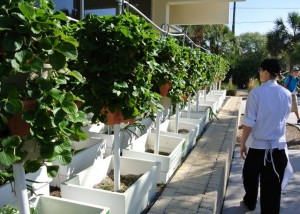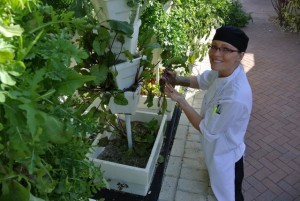Hydroponic Café Garden Takes Root at Eckerd College
It’s not very often that you get to sit among the plants used to create the meal you’re eating.
At Eckerd College in St. Petersburg, FL, the Bon Appétit team is taking advantage of the year-round sun to provide exactly that experience with a café garden. Over the last year, Executive Chef Valerie McHugh spearheaded the college’s installation of a hydroponic system that provides vegetables and fresh herbs to the kitchen, just steps away.
The café garden was built in two parts. The first phase focused on creating a kitchen garden, full of plants that could provide ingredients used frequently by chefs during day to day production. “We just walk outside at any point throughout the day to pick fresh herbs or vegetables for cooking and garnishing” Valerie told me. The garden is chock full of plant varieties ranging from staple herbs such as cilantro, basil, and thyme to less familiar plants such as beets, collard greens, sweet potatoes and radishes.
So far, the kitchen garden works best for ingredients used in small quantities, such as scotch bonnets, a type of chili pepper, and plants that regenerate quickly, such as basil.
After witnessing the Eckerd community’s enthusiastic response to the kitchen garden, the team embarked on phase two: a section specifically intended to grow strawberries for students to pick as they walk to class or their dorms after a meal at the café. Now the only problem is that there aren’t enough strawberries to meet the demand from students, staff, and faculty strolling by!

A second system was installed specifically to grow strawberries for Eckerd students, staff and faculty to pick as they pass by
Hydroharvest, one of Bon Appétit’s 1000-plus Farm to Fork vendors, sold the hydroponic systems to our team and helped install them onsite. Maintaining the garden requires two regular tasks: making sure the water tank is full and keeping up with the plant trimming when needed. Valerie’s team fills the water tank three times a week and it is set on a timer to water the garden three times each day.
Hydroponic farming, a small but quickly growing segment of agriculture, provides significant efficiency in terms of use of space, water and nutrients. For starters, the system is estimated to use 80% less water than a non-hydroponic system. The water is infused with needed nutrients – and plants use the nutrients more efficiently than in “conventional” agriculture, where fertilizer is usually applied in higher quantities than plants need and the land can absorb, causing excess nutrients to go into nearby surface and groundwater after a rain storm or watering. The pots stacked atop of one another are referred to as ‘vertical hydroponic’ systems, through which plants sometimes have to compete for room and sunlight, but space is used very efficiently.
I can’t wait to see what they grow next.
